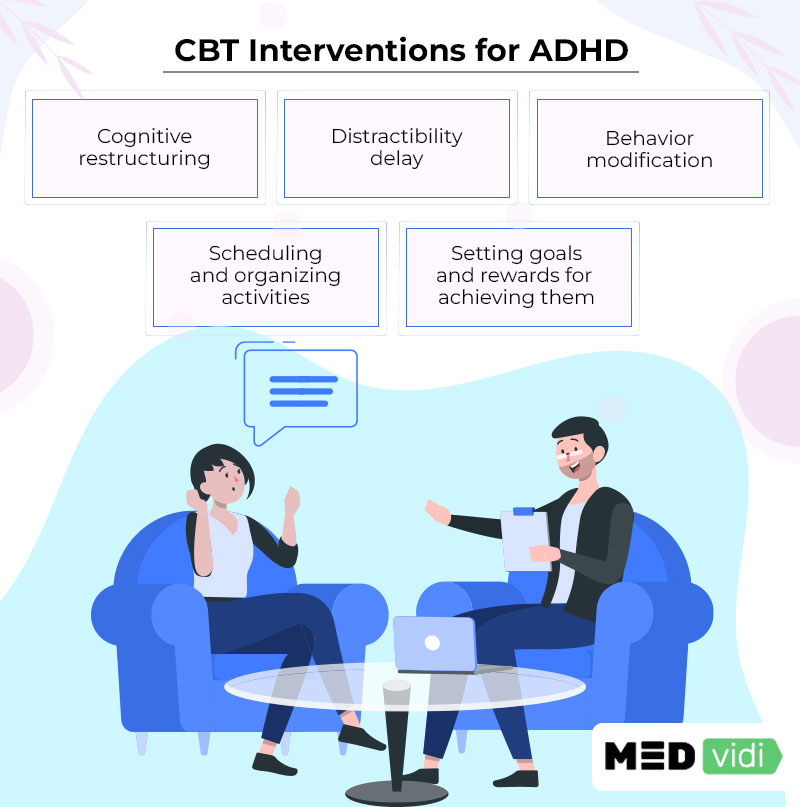Physical problems and the symptoms they create can be treated with medication. However, mental health conditions like ADHD may also require behavioral and psychological treatments. One therapy used for this disorder is CBT (cognitive-behavioral therapy).
The purpose of CBT is to teach one how to confront negative thought patterns and improve certain life skills. It also engages patients to master new behavior patterns that provide them strength and systematize their lives.
Since ADHD patients frequently battle with issues like low self-esteem, negative thinking, poor organizational abilities, and emotional challenges, CBT for ADHD has demonstrated its efficacy. Learn more about this type of therapy and how it helps adults with ADHD. Continue to read!
Choose the best ADHD online therapy for you with leading mental health experts. Click the button below to connect!
Cognitive-Behavioral Therapy (CBT) for ADHD
ADHD individuals may struggle with self-control and emotional regulation, which has a negative impact on their time management, long- and short-term planning, organization, emotional stability, and motivation. These problems in their daily lives cause repeated setbacks. The good news is that people with such symptoms can
Furthermore, it is widely known that individuals with ADHD are more likely to have
Examples of CBT Interventions for ADHD
There are many methods and strategies used in cognitive-behavioral therapy, and their choice is tailored to the needs of each patient. One of CBT’s key objectives is helping the patient learn how to use these strategies as new problems arise.
The following are some techniques frequently employed to treat ADHD symptoms.
Cognitive restructuring is the act of identifying irrational beliefs and swapping them out for sensible ones to tackle unfavorable thought patterns. Although it may not seem like a necessary element of an ADHD treatment program, this is advantageous for patients with co-occurring diagnoses of anxiety, depression, or poor self-esteem. They are retrained to have a more positive, constructive perspective of both themselves and their surroundings, thanks to cognitive restructuring.
Patients with ADHD have trouble planning assignments and activities. You may prioritize your duties and become more organized in life by using the behavioral component of CBT. Your CBT therapist helps you with each technique so you can use and maintain those skills:
- Plan your tasks and obligations consistently
- Create a daily schedule
- Manage your time well
- Engage in social activities
- Maintain a healthy lifestyle
Find out how CBT can help you regain control over your life. Get medical help from certified professionals.
Behavior modification is the process of altering one’s physical or mental response to a stimulus, which is beneficial for ADHD patients. Through various techniques and methods, the undesired habits are altered for more appropriate ones. The following methods are commonly employed:
- Reinforcements (positive and negative): used to reinforce positive behaviors
- Punishments (positive and negative): used to reduce unwanted behaviors
- Meditation: used to ease off stress and anxiety

The tendency of people with ADHD to become quickly distracted makes getting things done more difficult. The
Your therapist could give you some homework once you learn distraction-busting techniques so you can put them into practice each week until they become second nature. Your therapist may additionally provide advice on: establishing a distraction-free workplace, scheduling regular breaks, and utilizing an alarm or other reminder to check in with yourself and make sure you are keeping on task.
There are various cognitive-behavioral therapy worksheets that can be helpful, whether the therapist is searching for ways to lead the patient through treatment or a client is a practical person who enjoys learning by doing. Worksheets come in a variety of types depending on the patient’s needs, for instance:
- Fact-checking: recognizing that your thoughts may not be accurate
- Cognitive restructuring: utilizing Socratic questioning, a technique used to challenge irrational or illogical thoughts.
- Dysfunctional thought record: for people who struggle with negative thoughts, this worksheet helps them figure out when and why they tend to occur.
Only a licensed therapist can choose and specify a suitable treatment plan for you.
You can manage your ADHD symptoms by including several CBT activities in your regular routines. Although it is always advisable to consult with a licensed therapist if you have concerns about your general welfare, you can also use these straightforward methods on your own.
- Establish a daily schedule for your routine that runs from dawn to night.
- Decide on your objectives and give yourself the rewards that you deserve. Make sure rewards are appropriate for the goals achieved and that the goals are attainable.
- Uphold a healthy way of living. A vital component of general health that might help manage ADHD symptoms is eating nutritious foods and exercising frequently.
- Get organized and keep it up every day. Establish specific places for items like clothing, shoes, and school supplies.
How Effective is CBT for ADHD Adults?
The
Several pieces of research have proved the effectiveness of CBT in treating ADHD. For instance, a 2018 review looked at 14 low to intermediate quality research investigating CBT’s potential advantages as an ADHD treatment. The authors of the review stated that lowering impulsivity, hyperactivity, and inattentiveness appeared to be a benefit of CBT. Additionally, they discovered that using CBT in addition to medication appeared to be more effective than using medication only for easing symptoms of anxiety and depression and enhancing day-to-day functioning.
CBT Therapists: Where Can I Find Them?
Choosing the best therapist can be challenging. You can ask about a provider’s familiarity with CBT for ADHD and their level of professional expertise in utilizing it. A fantastic option to get in touch with CBT experts is through an online clinic. For complete satisfaction, test out our top-rated therapists at MEDvidi.













